
Leadership in agriculture takes many forms, but above all, leadership means preserving and protecting the land and providing agricultural products that are responsibly grown and can be sustainably sourced. Through our 19-month Illinois Agricultural Leadership Program (IALP) and our Advanced Leadership Training (ALT) for FFA instructors, community groups and agricultural partners, the IALF addresses the food and agriculture supply chain and the importance of protecting the environment, safeguarding public health, promoting animal welfare, and maintaining a financially viable agricultural community for generations to come.
Here are some of the examples of our graduate/leaders who are dedicated to responsible and sustainable agriculture:
Jeff Hackman (Class of 2018)
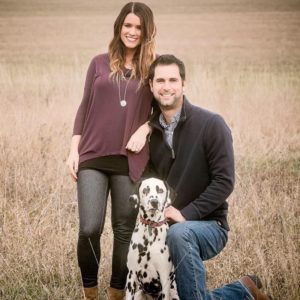
Today’s consumers are concerned about where their food comes from and how it is raised. As a consumer myself, I am also interested in buying food that is safe and raised in an environmentally friendly manner. As a farmer, I embrace many practices to help protect the environment.
At my family farm, we raise the Del Monte peas and green beans that you would find on your dinner plate. We are also proud to raise one of your favorite movie snacks, Weaver Popcorn. Since our soils are sandier soils we have decided to wait until the spring to spread our dry fertilizer plant food to reduce runoff or leaching. Our farm also uses the practice of side-dressing nitrogen that places the nutrient in the right place, the root zone, and also allows us to use the fertilizer during its time of maximum uptake to greatly reduce waste. Another great tool that we have in our area is the use of pivot irrigation to “spoon feed” our nutrients to our plants.
In addition, we have a safety feature on the irrigation pipe called a check valve. This is used to ensure that nothing flows back into the irrigation well, keeping our water safe. The technology for the nozzles we use during irrigation has improved over the years. The newest nozzles cut down wind and sun evaporation, which has reduced run time for irrigation. These are just a few practices of many that we and other farmers in our area use to be safe stewards of our environment.
As a 5th generation farmer, I take pride in what I do and look forward to paving the way for the next generation. I enjoy learning about the new technologies and practices that will take farming to the next level of environmental stewardship. On a personal level, I take the time to raise healthy plants that provide the natural nutrition that my family and your family deserves.
Susan Adams (IALP Class of 1996)
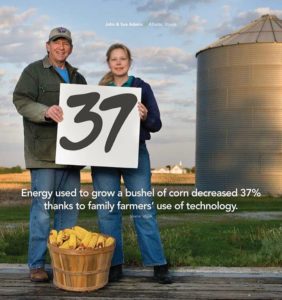
Susan Adams is a family farmer from central Illinois who was the recipient of the Illinois Corn Growers Association 2016 EnvironmentalAward. The award recognizes individuals who exhibit a commitment to conservation and environmental preservation. Described as “a voice that drives discussion and questions the status quo” her commitment to our natural resources and her ambition to make Illinois farmers constantly better is admirable. She and her husband, John, are the 5th generation to live and run the Adams family farm since it was homesteaded in 1862.
The Adams made a commitment to reduced tillage in 1976 and moved to no-till in 1983. The farm is currently 100% no-till and has been since 1988, with some strip till being used in the last 10 years. This continuous move to the most cutting edge management practices continues today, with Susan using GPS to apply fertilizers and crop protection productions only where they are needed and using a yield monitor to record yields and RTK. The Adams have also created nitrogen test plots in a field for several years to determine what levels of anhydrous with N-Serve make the most sense on their farm.
Susan is currently serving as Chair of the Illinois Water Authority Association.
John McCormick (Class of 2004)
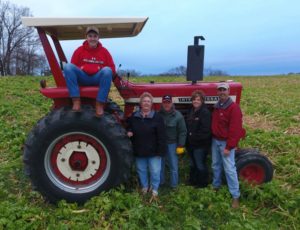
At McCormick Farms, we produce food in a sustainable and responsible way. In fact, I feel we have always been at the forefront of sustainability. My father and grandfather started no-till planting in 1970, long before it was a popular practice. We make sure we grow crops in healthy soil, using cover crops and managing nutrient use. Our rolling hills in southern Illinois make for beautiful landscape, but add a bit more challenge to manage in an environmentally responsible manner. We know that being responsible is not optional; it is the table stakes that ensure we’ll be able to produce food today and forever. I farm today for the same reasons my father and grandfather have farmed, and the reasons the next generation coming behind me will farm: to nourish our hungry nation and world. Resource conservation and sustainability are front and center at our farm.
See the McCormick Family Farms cover crop video here. https://www.youtube.com/watch?v=8yDXgaxrbbI
Ruth Zeldenrust (Class of 2014)
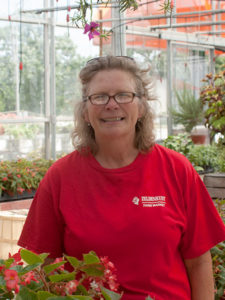
My garden is what you would call “supersized,” with 32 acres of fresh produce harvested from early summer to fall. We’re not certified organic, but use many of the same farming practices like crop rotation. And just because it’s marked organic, doesn’t mean pesticides aren’t used. Rest assured that everything we grow and sell is safe, high-quality, nutritious and most important: fresh from our fields.
- For weeds, we cultivate (think of a garden hoe, but larger) and pull weeds by hand.
- For bugs, I’d like for all my produce to be pesticide free. If I have to spot treat something, I label it and tell my customers. Like other farmers, I like to catch things early.
- If I see white moths on the cabbage, a lifetime of experience tells me I have to get in there and get after them quickly because if I don’t, they lay eggs, eggs turn into worms and the worms poop. And no one wants to eat that, including me.
- To kill the pests, I use Bt, an allowable pesticide for organic farms, and a naturally occurring bacterium that causes them to die after they ingest it.
There’s also limited amounts of fertilizer used. I test the soil to see what nutrients it needs. Rotating the crops (changing what is grown every year) and planting crowder peas that are not picked but instead are tilled back into the soil adds nitrogen that other crops have taken from the soil. I supplement with a small amount of the “bag” kind of fertilizer – the same that you’d get at the garden store – only when needed.
It’s this attention to detail that allows me to say unequivocally the produce we grow and sell is not only safe it’s, delicious and nutritious.
Discover more at http://www.zeldenrustfarmmarket.com/
Andrew Bowman (Class of 2014)
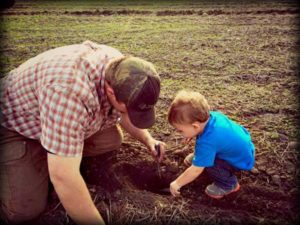
My farm is roughly the size of 1,300 football fields. As I see it, I’m the steward of those acres. I’m doing my best to grow the most from these acres in a sustainable way. For me it’s all about growing high-quality products that feed my family and yours.
The way I look at it, I’m not the owner of this farm – I’m the steward. Owners have rights; stewards have responsibilities.
Standing in my way every day are weeds and pests that feed on my crops. For a farm my size and with the crops we grow, it’s not practical to keep up with the weeds or insects by hand. I use herbicides and insecticides to protect my crops, but only those that are proven safe and only in the smallest amount needed to be effective.
Some folks have misperceptions about chemical crop protectants. Here’s what I want you to know about my chemical use:
- The only chemicals I use have been proven safe by the FDA, the USDA, and the EPA after rigorous testing.
- Before applying chemicals, the applicator must be certified for proper use and application.
- Today’s chemicals are precise, effective and leave virtually no residue on the soil, water or crop – that’s because they are designed to break down after they accomplish their job and become inactive.
- That’s why I’m confident I can walk through a sprayed field just days or even 72 hours later, and the products I harvest are safe to eat.
I’m a farmer. But I’m also a father. So, as I grow crops, my family’s health is the standard I weigh everything against. If it’s not good enough for my wife and 3-year-old son, then it isn’t good enough to be on your table either.
See Andrew’s comments on protecting our food and what that means for our plates here. https://youtu.be/TWVWMsfHU4c
Randy Sims (Class of 1984)
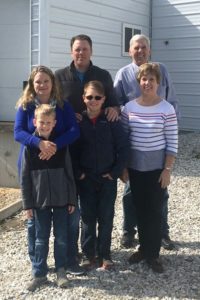
We are a family farming business that has prospered for over six generations on the same land in western Illinois. Not only are we a small business supporting our family and our community, but we are also consumers of the very products that we produce. That makes strategies of caring for our water, our land, our environment, our animals, investing in technology and our employees critical to our future success, health and sustaining our business into the future for our children and grandchildren. We consider ourselves as an integral part of the U. S. Food Production System – the most productive, highest quality and lowest cost food system in the world.
Our Family
I am a fifth generation farmer on our land along with my partners that include my wife, son, and daughter-in-law. In addition, we have organized our family farm in a way that my other children and their families, my sister and her family and cousins who grew up on this farm are able to maintain an investment in our family business if they so choose. I feel fortunate to have had parents and grandparents who provided a legacy of a family farming business where I could raise my family and provide an economic base for future generations. One critical principle passed on to me by my ancestors, was that “farming and agriculture is a business, not a way of life.” by of capital to grow and expand our business is from reinvesting the profits of our business. That places a special responsibility on each generation to make sound business decisions, so future generations of our family have the same opportunity I have had.
Grant Strom (Class of 2010)
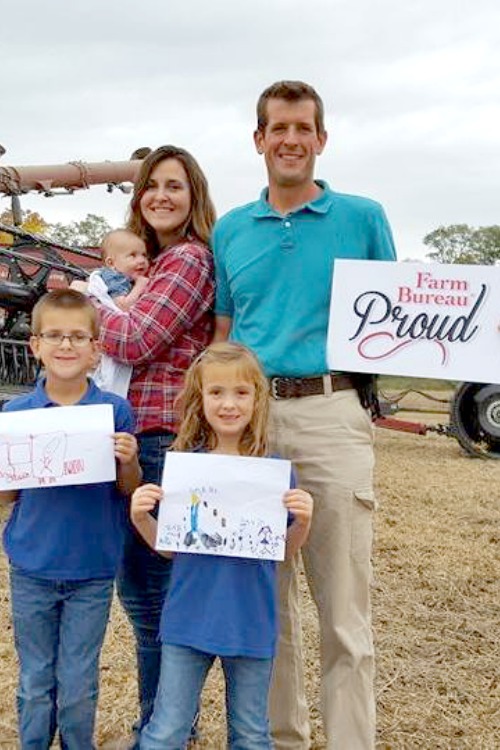
Grant and Kristen Strom operate a grain and 20-head Angus farm near Brimfield with their family. Grant is the president of the Knox County Farm Bureau and the Stroms are recipients of the American Farm Bureau Federation’s Young Farmers and Ranchers Achievement Award.
The proper usage of nutrients and the challenges of herbicide resistant weeds are big issues for today’s farmers. The Stroms understand the importance of preserving the land they farm and are committed to proactive sustainability practices when it comes to these issues.
That’s why Grant is actively involved in the Fertilizer Institute’s 4R Program. Through the 4R program, Grant serves as an advocate to help educate producers on the reduction of fertilizer run-off and best practices that benefit the land, farmers and the consumer. To view Grant’s contribution to this important sustainability initiative, please click HERE for the video, courtesy of Nutrient4Life.

